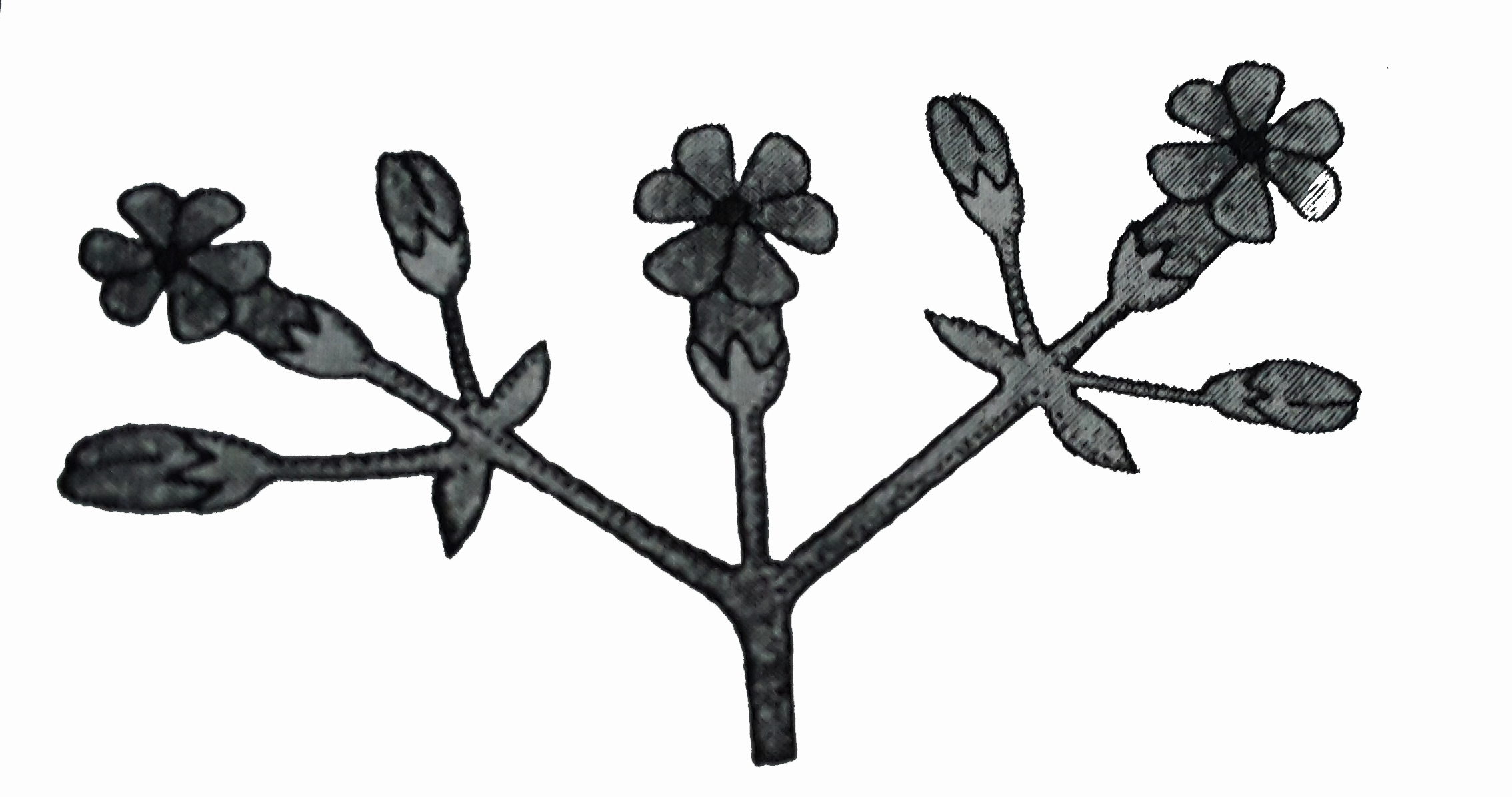Describe the umbel type of inflorescence.
Step-by-Step Solution:
1. Definition of Umbel Inflorescence:
- Umbel is a type of inflorescence where flowers are borne on short stalks (pedicels) that spread from a common point, resembling the shape of an umbrella.
2. Classification:
- Umbel inflorescence is classified as a type of racemose inflorescence. This means that the flowers are arranged in a branching pattern, but they originate from a single point.
3. Structure:
- In an umbel, the flowers grow from the peduncle (the main flower stalk) and radiate outward. This radial divergence creates a flat-topped or rounded appearance.
4. Flower Size:
- The flowers in an umbel are typically smaller than those in other types of inflorescences. This is due to the single peduncle from which the flowers branch out.
5. Example of Plants:
- A common example of a plant that exhibits umbel inflorescence is Centella, which is known for its characteristic flower arrangement.
- Umbel is a type of inflorescence where flowers are borne on short stalks (pedicels) that spread from a common point, resembling the shape of an umbrella.
- Umbel inflorescence is classified as a type of racemose inflorescence. This means that the flowers are arranged in a branching pattern, but they originate from a single point.
- In an umbel, the flowers grow from the peduncle (the main flower stalk) and radiate outward. This radial divergence creates a flat-topped or rounded appearance.
- The flowers in an umbel are typically smaller than those in other types of inflorescences. This is due to the single peduncle from which the flowers branch out.
- A common example of a plant that exhibits umbel inflorescence is Centella, which is known for its characteristic flower arrangement.
Topper's Solved these Questions
- BOOK - MODERN PUBLICATIONCHAPTER - MORPHOLOGY OF FLOWERING PLANTS EXERCISE - Chapter Practice Test (Section-C)4videos
MORPHOLOGY OF FLOWERING PLANTS
- BOOK - MODERN PUBLICATIONCHAPTER - MORPHOLOGY OF FLOWERING PLANTS EXERCISE - Chapter Practice Test (Section-D)2videos
MORPHOLOGY OF FLOWERING PLANTS
- BOOK - MODERN PUBLICATIONCHAPTER - MORPHOLOGY OF FLOWERING PLANTS EXERCISE - Chapter Practice Test (Section-A)6videos
MORPHOLOGY OF FLOWERING PLANTS
- BOOK - MODERN PUBLICATIONCHAPTER - MINERAL NUTRITION EXERCISE - CHAPTER PRACTICE TEST16videos
MINERAL NUTRITION
- BOOK - MODERN PUBLICATIONCHAPTER - NEURAL CONTROL AND COORDINATIONEXERCISE - Chapter Practice Test11videos
NEURAL CONTROL AND COORDINATION
Similar Questions
Knowledge Check
- Question 1 - Select One
Inflorescence is
Aarrangement of flowers on peduncle/floral axisBa system of branches bearing flowersCa branch bearing flowers in definite mannerDAll the above - Question 2 - Select One
Inflorescence is
AComposite (multiple) fruit developed from condensed inflorescenceBAggregate fruit developed from free carpelsCFruit develop from inferior ovaryDFruit develops from thalamus - Question 3 - Select One
Assertlon:-Racemose inflorescence is unlimited type of inflorescence.
Reason :-In Racemose inflorescence flowers arranged in acropetal manner.AIf both Assertion & Reason are True & the Reason is a correct explanation of the Assertion.BIf both Assertion & Reason are True but Reason is not a correct explanation of the Assertion.CIf Assertion is True but the Reason is FalseDIf both Assertion & Reason are false
Describe two main groups of inflorescence.
View Solution(a) Write the type of fruit against the following and furnish the other information asked :
Various types of fruits : Drupe, Achene, Capsella, Hesperidium, Cremocarp, Cypsella, Schizocarp
(i) Cococut - Edible part
(ii) Orange - Type of placentation
(iii) Coriander - Type of inflorescence
(b) Write the type of inflorescence against the foil owing and furnish the other information asked :
Various types of inflorescence : Racemose, Umbel, Cyathium, Capitulum, Cymose
(i) Euphorbia - Type of fruit (ii) Marigold - Type of fruitView SolutionDefine the term inflorescence. Explain the basis for the different types of inflorescence in flowering plants.
View SolutionThe compound umbel type of inflorescence is found in
I Coriandrum sativum
II Delonix
III H elianthus annus
IV Daucus carota
Choose the correct optionView Solutionthe type of inflorescence in hamelia is
View Solution

